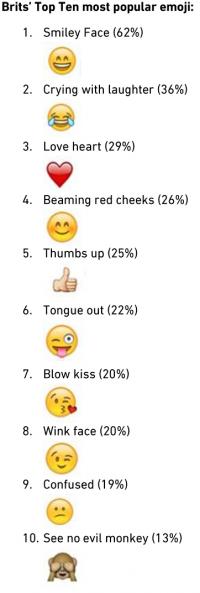Emoji 'fastest growing new language'
A Bangor University professor has teamed up with mobile giant TalkTalk to launch a new national PR campaign to help understand emojis – the picture based language.
Emoji is being adopted at a faster rate than any other language - that’s the verdict of a new study which reveals that 8 in 10 Brits (80%) are now using the colourful symbols to communicate.
The ‘Emoji IQ’ study by TalkTalk Mobile is the first piece of in-depth research on UK adoption of the new visual language taking the world by storm.
It reveals that emoji has well and truly taken off in the UK, with 62% claiming they are using the new language more than they were a year ago and 4 in 10 claiming to have sent messages made up ENTIRELY of emoji.
Findings reveal that 72% of the younger generation (18-25) now find it easier to express their emotions with the pictorial symbols than words, with over half (51%) believing emoji have improved our ability to interact.
But not everyone is as enthusiastic - 31% of over 40s admitted they avoiding using emoji in text, instant messaging and social media apps like Facebook because they lack confidence in how to use them appropriately. Over half (54%) of those aged over 40 admitted to being confused about what the symbols mean.
The research is supported by an education drive to improve understanding of the picture based language, launched today with ‘human emoji’ taking to the streets of London.
Findings from the study show over a quarter of Brits (29%) are using emoji in at least half of all text, instant messaging and social media communications they send.
The ‘Smiley Face’ emoji proved to be the most popular from a selection of commonly used symbols, with 62% of Brits identifying it as their most used character.
Meanwhile, ‘Reception girl’, ‘Halleluiah Hands’, ‘Shifty Eyes’, ‘Dancing Girl’ and ‘Unamused Face’ left the most scratching their heads.
TalkTalk Mobile has teamed up with the School of Linguistics and English Language’s Professor Vyv Evans to explain emoji with an online ‘Emoji IQ’ tutorial. It’s accompanied by an Emoji IQ test to find out whether you’re an Emoji Master, Emoji Enthusiast or Emoji Beginner.
Professor Evans comments: “Emoji is the fastest growing form of language in history based on its incredible adoption rate and speed of evolution.
“As a visual language emoji has already far eclipsed hieroglyphics, its ancient Egyptian precursor which took centuries to develop.”
TalkTalk’s Head of Mobile Dan Meader comments: “The explosion of social networks and messaging apps on our smartphones means that emoji are fast becoming the most popular way to quickly express how we’re feeling. With a little creativity there is no limit to what we can express with emoji.”
Professor Evans comments further: “Given the utility and added value provided by emoji, their usage is expected to increase exponentially across all age and cultural groups. While the uptake will differ by specific type of communication and function, it is not inconceivable that the majority of digital communication will feature emoji in future.
“Unlike natural languages such as English, Emoji is almost universally recognisable because it exploits the visual representation system. Emoji won’t replace traditional languages but it will increasingly be used to enhance them.
“I think it’s conceivable that emoji will increasingly be used to complement digital versions of written works. For instance, the inclusion of emoji to help convey meaning in abridged versions of Shakespeare could help bring those great stories to life for a whole new generation.”
Publication date: 19 May 2015
